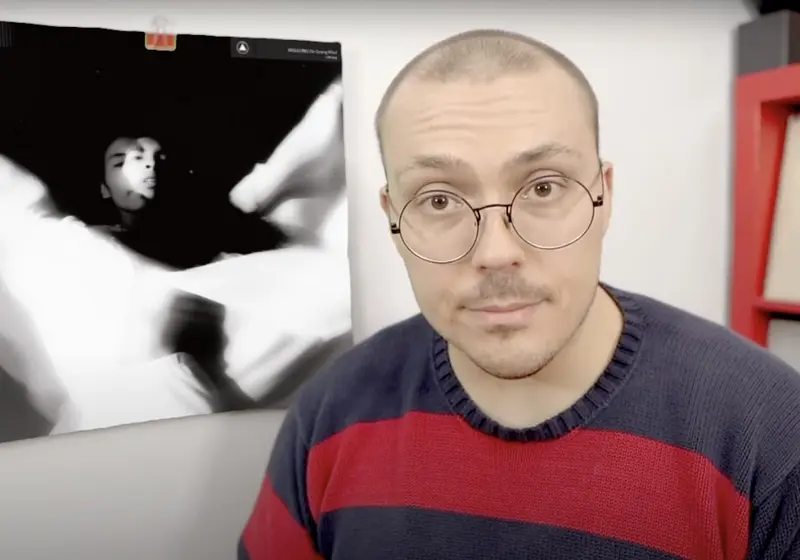Anthony Fantano: if you've been involved in the online music space in the past six years or so, you’ve definitely heard his name floating around the web. Self-proclaimed as “the internet’s busiest music nerd,” Fantano is known for his direct and comedic approach when reviewing music.
While many of his admirers believe that he's honest and genuine in his reviews, Anthony Fantano has been a divisive figure in the music community in the past few years, with his fans loving his tell-it-how-it-is attitude laced with references to memes and internet culture, and his critics finding fault with past controversies.
Love him or hate him, there is one fact that is difficult to shy away from, and that is the immense impact he is having on the new generation of music and artists. He is undoubtedly changing the way Gen Z processes music and is giving a voice to music, old and new. As of writing this article, Anthony Fantano’s main channel, theneedledrop, has amassed 2.6 million subscribers.
His second channel, fantano, has earned 1.5 million subscribers, and his live stream channel, TNDstreams, has 110,000 subscribers. He is without a doubt, the biggest name in music journalism.
However, he didn’t always wield the influence over the music community that he has presently. This is the story of Anthony Fantano, and how he is empowering a new era of musicians and creators.
Anthony Fantano, photographed. Credit to thequietus.com
Let us slide into your dms 🥰
Get notified of top trending articles like this one every week! (we won't spam you)Take the Quiz: Which Indian city is the perfect holiday spot for you!?
Let's match you with an Indian city that you would love!
Humble Beginnings
Anthony Fantano surprisingly didn’t get his start in music-related media on social media, as one might think. His first venture into music journalism was in the mid-2000s when he became a music director for Southern Connecticut State University’s college radio station. At the time, Fantano was a student at the institution, majoring in liberal studies with a focus on political science, communication, and journalism. In 2007, during his junior year, he became an intern at Connecticut Public Radio, where he hosted the first iteration of his show, the Needle Drop.
In addition, he was also a prominent figure within the music community on the message board site, 4chan. Fantano’s online journey actually began on 4chan, and many of his supporters from 4chan transferred over onto YouTube in support of theneedledrop. 4chan played such a significant role in the early online career of Anthony Fantano that he would be dubbed "The King of /mu" (the music board on 4chan). As much of an asset 4chan was in giving Anthony Fantano a platform to talk about music, later on in his career, it would prove to be a source of further contention.
The Needle Drop was a show where he’d review albums and songs and generally give his opinion on music as a whole. As a radio show, the Needle Drop was met with a mostly warm reception and eventually would do so well that later on, it would air on a dozen other radio stations. Inspired by the Needle Drop’s moderate success on the airwaves, Fantano opened a blog for the Needle Drop, hoping to strike a bigger chord with his target demographic and garner a larger audience.
While the blog did reach people, it wasn’t nearly enough for him to critique music full-time. It was 2009: the US was in the middle of the worst economic crisis since the Great Depression, with hundreds of thousands of Americans losing their jobs. However, some industries were hit harder than others, particularly the radio business, which was already a dying media format due to the younger generation’s affinity for the internet and social media.
What this all meant for young hopefuls such as Anthony Fantano was that breaking into journalism, especially something as niche as music journalism, was hard. Really hard. So at this point, it looked as if Fantano had two options: A) Give up on his aspirations of being a music critic to explore other career paths or B) Keep writing the Needle Drop as a blog and hope that something eventually comes out of it. However, Anthony Fantano chose neither A nor B.
Instead, he chose C) to change direction and format. This shift in direction came in the form of an, at the time, on-the-rise video-sharing platform called YouTube.
Intern to Internet Star
In the video, Fantano displays his signature style of comedy combined with a critique that his fan base would come to admire. In later years, he would add characters to his videos for more comedic appeal. Most notably, Anthony Fantano's alter ego, Cal Chuchesta.
Cal Chuchesta is supposedly Anthony's roommate who is ignorant of anything music-related. On August 18, 2015, Fantano independently released a mixtape under the Cal Chuchesta name titled The New CALassic.
YouTube is currently a media juggernaut, but in the 2000s, it was quite the opposite. Social media as a whole was still very much in its infancy, so no one really understood how it worked. YouTube was no exception to this novelty.
Back then, YouTube wasn’t a platform for egotistical, pseudo-famous influencers with insane amounts of followers to get into pointless internet drama in order to increase their own social capital; nor was it a place for multimillion-dollar corporations to create channels, to garner even more money than they already have. YouTube was a place for your average individual, a place to upload crazy clips and vlogs about your daily life. It was also a place for artists.
Musicians, writers, comedians, actors, and everyone in between. Anthony Fantano, being one of those artists, looking for a creative outlet, turned to YouTube for answers. In January 2009, he posted his first video to his channel, TheNeedleDrop.
His first actual review is widely debated among fans since a lot of his earliest videos were deleted or unlisted from his channel, but his first available music review was a track review of a Slipknot song. However, the true bread and butter of the Needle Drop would be its album reviews. Fantano would become a massive force in the music criticism community, but that wouldn't come without its scandals.
Controversies
Despite his numerous years online, Fantano has dealt with scandals throughout his internet career. His most notable is the infamous Fader article incident in 2017. Outside his mild-mannered music reviews on TheNeedleDrop, he had another channel under the name, “thatistheplan,” where he’d upload satirical style music reviews, which served as a parody to videos on his main channel.
His separate channel was relatively small and remained mostly underground, until the publishing company the Fader released an article claiming that the channel “thatistheplan” was a pawn for the far alt-right, and made numerous damning accusations against Fantano. A lot of the arguments made in the article were faulty, like how the author stated that his vocabulary took on a “screechy, 4chan friendly slant.” The writer made allegations accusing him of being racist, an edgelord who purposely disrespects sensitive topics with the intent to shock or offend their audience, among many other allegations based on his content on “thatistheplan.” During and after the presidential election in 2016, we saw more influencers speaking openly about their political beliefs, and this became a cultural norm within the internet landscape.
Throughout this time period, everyone and anyone who has confirmed or assumed political beliefs became fair game to expose or criticize, and the Fader article is a prime example of this behavior.
One might first assume that this is just some silly internet feuding and that it blew over rather quickly, but quite the opposite occurred. Fantano had a speaking tour scheduled later that year, but it was canceled due to the allegations against him and his character, and he lost over a million dollars. Whether you’re an online influencer or in the public eye in general, you hold a certain amount of power and influence over your audience.
This is not to say that Fantano was in the wrong for posting what he did, nor that he abused his power, but more to make a point about how small actions can change how the public perceives you and can have negative consequences. In response to the allegations, Anthony Fantano released a 20-minute response video on his main channel denying and debunking all the claims made against him.
In response to a claim accusing him of being a racist because he parodied black rappers, he stated, “Again, it's kind of a moot point, because it's not a parody of the artist themselves, it's a parody of their over-eager fans. The writer fails to mention that I have harshly critiqued and clowned white artists and rock musicians in the past on my main channel, where I do it without a lick of irony or satire, which is everything “thatistheplan” is shrouded in.” In a settlement between Fader and Fantano, Fader removed the article against Fantano from their website.
On the topic of 4chan-related drama, in 2015, Anthony Fantano was mistaken for the Oregon mass shooter Chris Mercer by the Australian news station, SBS News.
The broadcast showcased photos of the perpetrator, Chris Mercer, who has a similar resemblance to the music reviewer. This mass confusion occurred because users on 4chan (a website where the mass shooter was frequently active) noticed the resemblance to the shooter and started to circulate his photo around in an attempt to confuse the news media. In a response video, an upset Fantano immediately answered to the situation, stating that he was soon planning to pursue a cease and desist against SBS if they continued to use his image in relation to the Oregon shooting.
Fantano also addressed the similarities in appearance to the shooter, stating: “The person who has been named as the shooter, I guess, has a short haircut, glasses, a round head, and is on the internet,” Fantano explains in the video. “That’s enough to draw a visual comparison between two people.” “So, of course, the internet, having the dark sense of humor that it does, says that I look like this guy, which is, in my opinion, not really something to be joking too much about. The wound here is still very fresh, it’s raw.” However, in all his controversy, this does not take away from what he knows best: music.
How Anthony Fantano Breaks Down An Album
Anthony Fantano is known for having a distinctive style of critique, unlike his contemporaries. He typically rates albums on a scale of one to ten with an accompanying adjective [Example: A "strong" six, a "light" seven, etc.] A trait that Fantano possesses that is well known amongst those who watch his content, is that he is not afraid to disagree with an opinion held by the majority of the public. He is brutally honest in his reviews and isn't afraid to speak his mind.
A lot of his reviews on albums have been a point of contention with members of his audience, with some of the most critically acclaimed albums of the year receiving lukewarm reviews from him (For instance, the album “My Beautiful Dark Twisted Fantasy" by Kanye West receiving a 6/10) The highest score an album can receive from him is the coveted "ten out of ten." But he isn't generous with tens at all. So much so, that in his several years as a music critic, only seven albums have gotten the rating ("To Pimp a Butterfly" by Kendrick Lamar, "The Money Store" by Death Grips, "To Be Kind", by Swans, "You Won't Always Get What You Want" by Daughters, "Sinner Get Ready" by Lingua Ignota, "Kids See Ghosts" by Kids See Ghosts, and "The Turning Wheel" by Spellling)
On theneedledrop, he tends to review albums track by track, describing his issues and possible inconsistencies in the songs. He'll usually still include things that he appreciates about the album overall. It might be the production quality, themes, or lyricism.
Something truly admirable about Fantano's style of reviewing is that even if he particularly dislikes an album, he would never say that anyone who likes this album has poor taste in music. Even if he completely rips an album or song to shreds, he won't judge the target audience for listening. In his description box, he often states, "Y'all know this is just my opinion, right?" As a reader, you may be thinking, "Okay, now we know how he reviews albums, but anyone could do that.
What makes Anthony Fantano so special? What differentiates him from any other music blogger making content inside their home? That point leads me to the next and final part of this article, Anthony Fantano's cultural impact.
Impact and Conclusion
One of the things that makes Anthony Fantano so special, is that he was one of the first of his kind. This isn't to say that he was the first music critic to ever exist, as there were those who came before him that definitely served as inspiration for his current work. However, he was one of the first of his kind to make a solid living off of music criticism on YouTube and modern social media in general.
As I stated earlier in this article, when Anthony Fantano started his internet journey, social media was still a very new thing. The social media platforms most commonly associated with teen culture such as TikTok, Snapchat, and Instagram weren't even around yet. He broke ground in what could essentially be considered as "unmarked territory", and hasn't fallen into relative obscurity after over a decade online.
This definitely isn't something to scoff at, as some creators who ruled the online stratosphere when theneedledrop was just taking off, are irrelevant in today's internet climate. Another thing that makes Anthony Fantano so great is that he is giving a platform to artists who wouldn't get much of a platform otherwise. He does this by reviewing albums by many artists, including those belonging to independent labels who wouldn't get much publicity from their releases otherwise.
He gives a voice to the silent, and that is truly commendable. He is leading the way for a new era of musicians to have their moment in the sun and get the recognition they truly deserve, as well as being at the forefront of the music vlogger movement. Despite his critics, Anthony Fantano is a trailblazer.
He’s giving life and power to a new generation of creators. And for that, he deserves our generation's uttermost appreciation.











